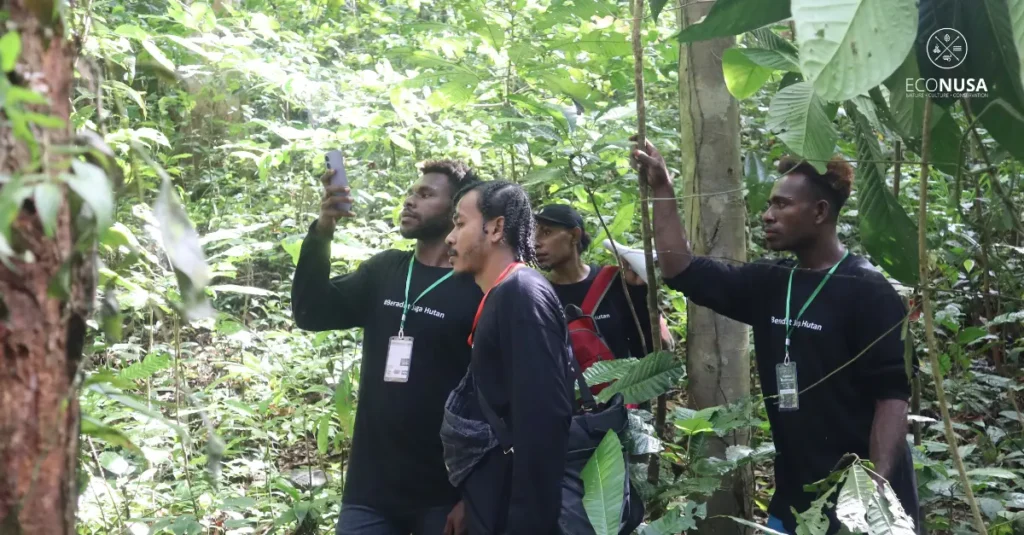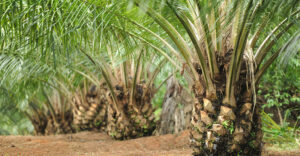
The forests of Papua play a crucial role, not only for the preservation of the world’s ecosystems but also for the lives of the surrounding communities. As the lungs of the world, Papua’s forests hold extraordinary biodiversity, serve as habitats for many endemic species, and are vital in maintaining the balance of the global climate. Beyond that, these forests also provide direct benefits to the local indigenous communities who rely on the forest for their daily needs, including food, medicine, and building materials.
However, the threats to Papua’s forests are becoming more apparent, ranging from deforestation, habitat destruction, to illegal activities. Therefore, it is important to preserve the forests so that their benefits can be enjoyed not only by the indigenous people today but also by future generations. To support forest conservation efforts, EcoNusa organized SMART Patrol training for indigenous communities in West Papua. The training took place over five days, from January 20 to 24, 2025, and was attended by various representatives of indigenous communities, government institutions, and environmental organizations in the West Papua region.
“The goal of this SMART Patrol training is to provide knowledge to indigenous communities so that they can play an active role in monitoring and protecting their customary forests, while also introducing technology that can support their sustainability,” said Charles Sroyer, a member of the SMART Patrol event committee.
SMART Patrol is an innovative application designed to facilitate data collection related to forest management and protection. This app can be used by indigenous communities to collect, manage, and analyze data directly linked to field activities. The system is connected to smartphones, allowing for more efficient and effective data management.
Read Also: A Travel Note: Biodiversity Survey in Kaprus Village
Edison Syufi, a participant from the Ireres Tribe in Tambrauw, said that the app is very useful for indigenous communities in documenting their natural wealth. This data can be used by the government or other parties for the purpose of indigenous community development. Additionally, the SMART Patrol app is very helpful for indigenous tasks, as it saves time, effort, and costs.
“After we return from here, we will use the app to record all biodiversity and anything in our customary territory. Then, we will bring it to the district government to seek recommendations for managing the recognition of our customary land rights to the state,” he said.
SMART Patrol has various benefits, including:
- Increasing Community Participation: It provides an opportunity for indigenous communities to actively participate in monitoring and protecting their forests. With this app, they can directly engage in data collection and supervision of their customary forest areas.
- Structured and Measured Data Collection: The app allows the collected data to be more structured and integrated with management systems, making it easier to manage information for better planning and evaluation of forest management.
- Efficient Data Management: By using SMART Patrol, which is connected to smartphones, the data collected can be managed directly and efficiently, reducing manual errors and speeding up data-based decision-making.
- More Accurate Decision-Making: The data collected using SMART Patrol can serve as a strong foundation for planning more precise forest management policies based on current facts and information.
This training was attended by 27 participants from various indigenous tribes, including the Irires tribe from Tambrauw District, the Sough Bohon tribe from South Manokwari, and the Kuri tribe from Bintuni. In addition to indigenous communities, the event also involved representatives from the Forest Management Unit (KPH) Bintuni and South Manokwari, the University of Papua, and the Ekozona institution.
Read Also: Aara Indigenous Community Proposes Recognition of Customary Land
The training was held at Mansinam Beach Hotel in Manokwari, and participants were also given the opportunity to directly apply the knowledge gained in field practice, at Gunung Meja. There, they learned how to use SMART Patrol to collect data related to their customary forests.
“The hope is that after this training, the indigenous communities will not only have individual knowledge and skills but will also be able to document data about their customary forests effectively. In this way, the collected data can be used to plan more effective management in the future,” said Laurio Leonald, SMART Patrol trainer.
Nelce M. Budhi, a participant from KPH Bintuni, thanked EcoNusa for the knowledge shared. He mentioned that the material provided would be a valuable resource for the KPH team and the Kuri Village community in conducting forest patrols as part of their forest security efforts. Nelce hopes that EcoNusa’s support will be increased so that the community can be more actively involved.
This SMART Patrol training is an important step in supporting sustainable forest management in West Papua. By involving indigenous communities in data collection and decision-making, it is hoped that the forests of West Papua will remain protected. This initiative is also expected to have a positive impact not only on the preservation of nature but also on the welfare of indigenous communities who depend on the forest as a source of livelihood.




